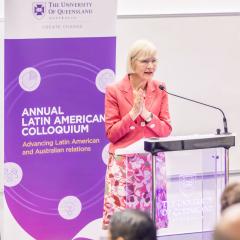From solar breakthroughs to smart grids, the future of energy is being written now. The University of Queensland (UQ) and the Indian Institute of Technology Delhi (IITD) are contributing to that narrative through their established partnership within the UQ-IITD Research Academy.
During a visit by IITD Director Professor Banerjee to UQ on February 6 and 7, UQ hosted a special seminar focused on energy transition, where Professor Banerjee and UQ Professor Adrian Panow engaged in an in-depth discussion on energy transitions in India and Australia.
“Both UQ and IITD are very strong in clean energy research areas,” Pro-Vice-Chancellor (Global Partnerships) Mr Brett Lovegrove said.
“India and Australia have set ambitious net-zero targets – 2070 for India and 2050 for Australia. These commitments underscore the importance of our collaborative work through the Academy to address the challenge of decarbonising key industries.”
“After our most recent intake, the Academy has 121 enrolled PhD students, in addition to the 18 graduates of our joint program. Many of these students are working on important research under the Academy’s Clean Energy and Sustainability theme, and all are being led by an accomplished supervisor at both UQ and IITD,” Mr Lovegrove added.
The UQ–IITD Research Academy aims to develop global solutions through collaborative research – and its joint PhD program is at the heart of this effort.

Q&A with IITD Director, UQ Energy Transition Network Director and Academy PhD candidate on opportunities for research collaboration
Professor Rangan Banerjee, Director of IITD, is a world-leading expert in energy science and engineering. He established a megawatt-scale Solar Thermal Power Testing and Research Facility funded by India's Ministry of New and Renewable Energy. He contributed to India’s Technology Information, Forecasting and Assessment Council (TIFAC) Technology Vision 2035 and was the lead author for Industrial Energy Efficiency in the Global Energy Assessment by International Institute for Applied Systems Analysis (IIASA) in Austria. He also reviewed the UK's energy research program in 2010.
Given India's focus on renewable energy, are there major government or industry funding sources for UQ and IITD researchers to target for collaboration in this area?
The two countries together already have the strategic research partnership such as the Australia-India Strategic Research Fund, and we are members of Quad [Quadrilateral Security Dialogue, which plays a significant role in promoting clean energy and climate resilience in the Indo-Pacific region]. So, I think we must make some efforts to see that we can create a fund, which is specifically India and Australia, around energy transitions.
There's a public perception that green energy is expensive. Is there any initiative from the Indian government to raise public awareness about opting for green energy?
There are a whole host of policies and interventions and with the idea of public procurement, of green energy, the large power plants and the cost effectiveness of that is projected significantly in the Indian media.
India’s energy transition in the electricity sector involves diversifying the supply mix and improving efficiency. In the transport sector, the shift away from oil includes adopting compressed natural gas (CNG), electric, hydrogen, biofuel, and methanol, as well as promoting public transport and reducing air travel demand. For cooking energy, the focus is on LPG, electricity, and modern biomass. Buildings are moving towards Net Zero and Energy Plus standards. The low carbon industry emphasises efficiency, renewable energy, carbon capture, utilisation and storage (CCUS), and next-generation processes.

UQ has a lot to offer in the energy transition space.
Professor Adrian Panow, Director of the Energy Transition Network noted, 250 research topics were identified and of those over the last 5 years, 367 researchers within UQ have collaborated. Over this time, they had 2,564 collaborations between them that involved publication or a grant.
UQ already has people working together. Some relationships exist but others need to be created where energy transition challenges are best addressed through a multidisciplinary effort with technical and non-technical approaches.
This is where UQ’s relationship with our flagship partner Indian Institute of Technology Delhi comes in. We’ve a lot to offer them, and they’ve a lot to offer us. Our collaboration can create opportunities for early and mid-career researchers to participate in major research programs and grow into research leaders.
A challenge common to the Australian and Indian electricity grids is the rapid change, often driven by consumers, from large, centralized generation to a system made up from many small, local Distributed Energy Resources (DER). Extraordinary increases in the number of solar panels on roofs of houses, apartments and factories, bioenergy (particularly in India), batteries in neighborhoods and in electric vehicles that need charging but can also deliver electricity are among the changes that need to be understood and managed if reliability of the overall system is to be maintained. Critically, the energy transition needs to be inclusive and fair. Participation by social scientists, economists, legal experts as well as scientists and engineers is essential. The multidisciplinary UQ-IITD collaboration is well-placed to deliver a new workforce that crosses traditional professions.

UQ-IITD Research Academy PhD candidate Meera Sudeesh, gave her first public presentation on improving solar cells looking at the material aspect of organic solar cells (ultrafast time-resolved spectroscopy) instead of the silicon-based commercial solar cells.
How has your research experience been with UQ and IITD?
I'm very satisfied. I get to use the best research facilities of both institutes. I get to be the student in both institutes. I get to enjoy all the privileges of being a student in a particular institute in two countries. I have two supportive supervisors so I get two different insights from them.
What are your plans after completing your PhD at the UQ-IITD Research Academy?
I can turn to industry, or I can stay in academia. I think the course of my PhD will decide it. By the end of it I'll have an idea what to work on further.
Learn more about the UQ-IITD Research Academy
UQ will host the Academy’s annual symposium 1-2 July 2025Subscribe to the Academy newsletter
Images: Josie Dietrich



